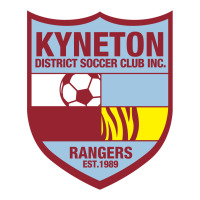Rangers Code of Behaviour
Codes of Conduct for the Kyneton District Soccer Club:
It is vital that everyone involved in sporting activities, whether they are athletes, coaches, parents, officials or supporters understand their responsibilities to ensure that all participants enjoy the sport.
PLAYERS’
CODE OF BEHAVIOUR
(a) Play by the Rules and within the spirit of the game;
(b) Do not argue with the match official. If you disagree, have your captain or coach approach the match official during a break in play or after the match is concluded;
(c) Control your temper. Verbal abuse of officials or other players, deliberately distracting or provoking another person is not acceptable or permitted in any sport;
(d) Maintain your focus and work hard for yourself and your team;
(e) Be a good sport and be prepared to acknowledge good play whether it is from your team or the opposition;
(f) Treat all players as you would like to be treated. Do not interfere with, bully or take unfair advantage of another player;
(g) Cooperate with your coach, team mates and opponents. Without them, there would be no competition;
(h) Play for your own enjoyment, and not just to please parents and coaches;
(i) Remove all jewellery prior to training and match play, as it is a hazard to you and those around you;
(j) Do not accept or use any banned or unauthorised drug(s), including the consumption of alcohol at any time.
COACHES’
CODE OF BEHAVIOUR
(a) Remember that players participate for the fun of it and that winning is not everything;
(b) Be reasonable in your demands on younger players time, energy and enthusiasm,
(c) Teach your players to abide by the Rules and Laws of the Game;
(d) Ensure that equipment and facilities meet a reasonable safety standard and are appropriate to the age and ability of the players;
(e) Modify your approach to suit the skill levels and needs of players;
(f) Develop and enhance respect between players, opposition coaches and the decisions of the match official;
(g) Follow the advice of a physician when determining the extent of a player’s injury and beyond that, when players are returning from injury to training and match play;
(h) Keep up to date with the latest coaching practices (refer to Coach Accreditation Criteria);
(i) Take time out to teach players (& others) the Laws of the Game, hence raising their awareness;
(j) Remind all players to play within the spirit of the game at all times;
(k) Ensure players are good sports and ensure each team member shakes the hand of their opponents at the conclusion of every match;
(l) Do not smoke or consume alcohol from the team bench (Technical Area) or sideline;
(m) Remember the actions of yourself and your team is reflective of the perception others take away with them.
PARENTS’
CODE OF BEHAVIOUR
(a) Remember that children play the sport for their enjoyment, and not yours;
(b) Encourage children to play according to the rules and spirit of the game;
(c) Encourage all children to participate, do not force them;
(d) Focus on the child’s efforts and performance rather than the result of the activity (that is, winning or losing);
(e) Encourage children to always participate according to the rules;
(f) Never ridicule, yell at a child for making a mistake or losing a game;
(g) Remember that children learn best by example, so applaud good play by both teams;
(h) Support all efforts to remove racial and religious vilification, verbal and physical abuse from sporting activities;
(i) Respect the match official’s decisions and teach your child to do likewise;
(j) Show respect and appreciation to Club officials, including coaches, officials and administrators. Ensure any issues are raised through the correct channels;
(k) ‘Smart Supporting’ – not loud and intense but calm, relaxed and at all times positive;
(l) Respect the rights, dignity and worth of every young person regardless of their gender, ability, cultural background or religion;
(m) Do not smoke or consume alcohol near the team bench (Technical Area) or sideline.
ADMINISTRATORS’
CODE OF BEHAVIOUR
(a) Help coaches and officials highlight appropriate behaviour and skill development, and assist in raising the standards of coaching and officiating;
(b) Ensure everyone involved in football emphasises fair play, and not winning at all costs;
(c) Be tolerant and calm under pressure and approach problem solving in a supportive manner as members and players will expect you to set an example for others;
(d) Make every effort to educate persons who breach these guidelines from time to time.
SPECTATORS’
CODE OF BEHAVIOUR
(a) Applaud good play and performances from both teams, and be forward in congratulating all participants on their performance regardless of the final outcome;
(b) Respect the match official’s decisions on the day;
(c) Condemn the use of violence in any form, be it by spectators, coaches, officials or players;
(d) Show respect to for both teams when watching matches, because without them there would be no game;
(e) Encourage players to follow rules and accept the decision of the match official;
(f) Do not intimidate, harass or use foul language towards, players, match officials, Club Officials or spectators.








